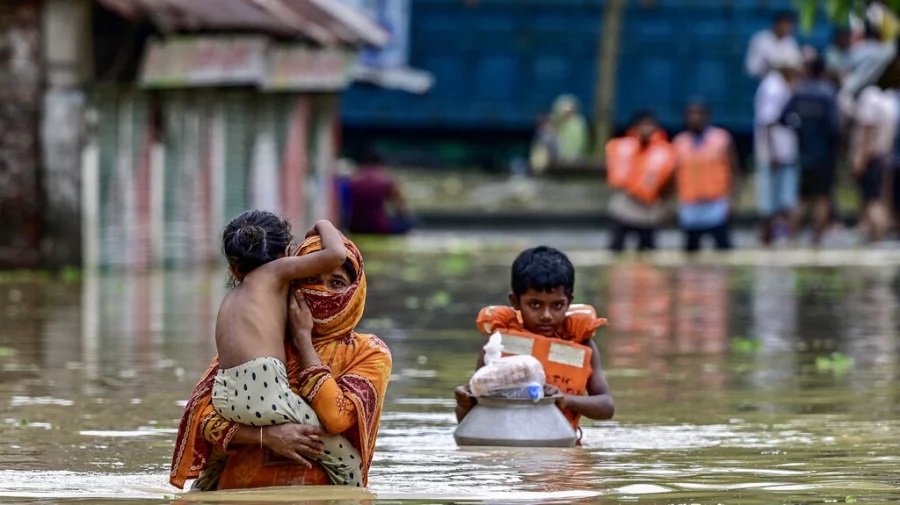Rising temperatures, rising anxiety
Ruhul Amin | Source : Dhaka Tribune, 24 January 2025

Climate change is an undeniable and pressing global crisis. While it is often discussed in terms of environmental and financial costs, one of its most insidious impacts lies in the deterioration of mental health.
The recent devastating fires in California serve as a stark reminder of the physical destruction climate change brings. Yet, the ripple effects extend far beyond the flames -- affecting not only ecosystems but also the well-being of individuals and entire communities.
In Australia, the Great Barrier Reef, once a thriving marine paradise, is succumbing to the rising ocean temperatures, leading to widespread coral bleaching and the collapse of habitats that sustain countless species. This is not an isolated case. From the warming temperatures in tropical regions to the unchecked spread of diseases, climate change is increasingly influencing biodiversity and public health in ways that are too often overlooked.
Perhaps one of the most poignant examples of climate change’s impact on the natural world is the alarming shift in the behaviour of bees. Rising temperatures have disrupted their breeding cycles and working hours, creating a mismatch with the timing of plant pollination. This, in turn, jeopardizes plant life cycles, threatening food production systems worldwide.
Similarly, the spread of mosquito-borne diseases like dengue fever has intensified in tropical regions, fueled by higher temperatures that create an ideal breeding ground for the Aedes aegypti mosquito.
But this is not just a danger to physical health. Climate change takes a toll on mental health as well. Rising temperatures correlate with increased rates of irritability, anxiety, and depression. As the environmental landscape changes, so too does the psychological landscape.
A growing phenomenon -- eco-anxiety -- illustrates this reality. For many, the existential threat of climate change evokes fear and helplessness, particularly among younger generations who worry about the future. Studies have shown that exposure to extreme weather events like floods, droughts, and wildfires can lead to trauma, post-traumatic stress disorder (PTSD), and generalized anxiety.
Eco-anxiety, a term used to describe the anxiety or distress related to environmental degradation, underscores the intersection of climate change and mental health. This emotional response is not solely triggered by immediate disasters; it is also the result of a gradual realization of an uncertain future, where food insecurity, water scarcity, and the loss of biodiversity have become a harsh reality for many communities.
Bangladesh, situated in the heart of Southeast Asia, is particularly vulnerable to the devastating effects of climate change. Rising temperatures, prolonged summers, and the increasingly unpredictable nature of the rainy season are just a few of the challenges facing the country. In fact, from 1991 to 2023, the average temperature in Bangladesh has risen by approximately 0.5 degrees Celsius, and this trend continues to worsen. The impact is not only felt in the environment but also in the lives of millions of people.
Exposure to extreme weather events like floods, droughts, and wildfires can lead to trauma, post-traumatic stress disorder (PTSD), and generalized anxiety
The consequences of climate-induced disasters, such as cyclones, floods, and river erosion, are far-reaching. These events displace entire communities, leading to loss of homes, land, and livelihoods. The resulting stress, anxiety, depression, and PTSD are widespread, particularly in rural areas where access to mental health services are limited. A study has shown that more than seven million people in Bangladesh have been displaced due to the effects of climate change, many of whom struggle with psychological issues in the aftermath.
In addition to direct natural disasters, climate change also disrupts the socio-economic fabric of society. Smallholder farmers who are unable to produce crops due to erratic weather patterns face mounting financial pressure. This stress often leads to heightened anxiety and, in extreme cases, suicide.
The mental health crisis in Bangladesh is exacerbated by societal stigma and a lack of awareness. Mental health issues are often dismissed as a sign of weakness or "madness," leading many to avoid seeking treatment. Although the government has made strides in expanding mental health services, these efforts are insufficient to meet the growing demand.
As climate change continues to intensify, the mental health crisis in Bangladesh requires urgent attention. Several critical steps must be taken to mitigate the psychological toll of climate change on the population.
First, raising awareness about the impact of climate change on mental health is essential to reduce the stigma surrounding mental health issues. By educating the public about eco-anxiety and PTSD caused by climate-related events, people can understand that these issues are treatable conditions, not signs of weakness.
Second, expanding mental health services, particularly in rural and remote areas, is crucial. This can be achieved by training more mental health professionals and integrating mental health support into disaster relief efforts, ensuring that these services provide both physical treatment and emotional counseling.
Rapid rehabilitation programs should also be established following natural disasters, offering social support, income-generating opportunities, and alternative mental health services to help affected individuals regain stability.
Moreover, building community support and social cohesion is vital for mental health recovery, especially for those displaced by climate-related disasters. Encouraging empathy and cooperation among community members can alleviate feelings of isolation and despair.
Finally, changing social attitudes toward mental health is imperative, promoting the understanding that mental illness is a treatable condition rather than something to be feared or ignored. This shift can be achieved through education, public campaigns, and advocacy programs.
As the climate crisis intensifies, so too will the mental health challenges faced by individuals and communities. Addressing this crisis requires a holistic approach that combines climate action with robust mental health support systems.
It is only by building resilience, fostering social cohesion, and providing accessible mental health care that we can hope to mitigate the psychological toll of climate change and protect the well-being of future generations.
Ruhul Amin is a research associate at the Bangladesh Institute of Governance and Management (BIGM).